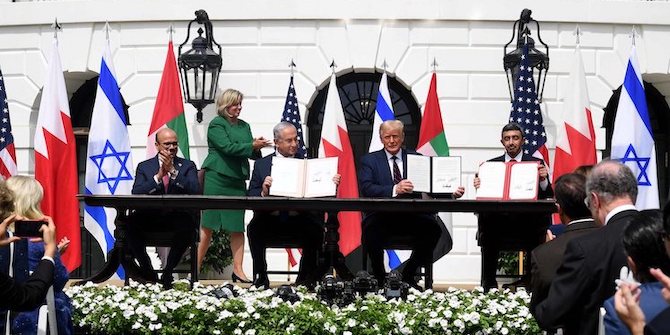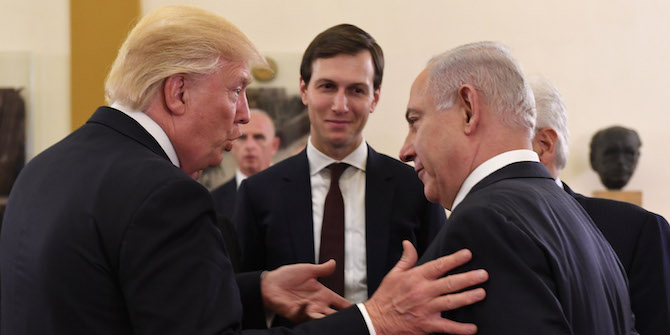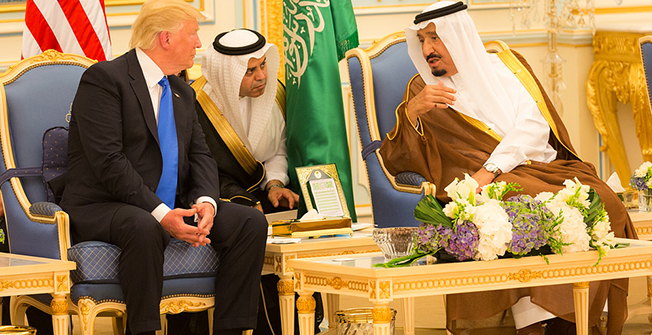by Firoozeh Kashani-Sabet

The announcement of yet another historic agreement between an Arabian government in the Persian Gulf – Bahrain – and the State of Israel marks a tragic day for Iran. As a country with a deeply rooted Jewish population, Iran should have forged the path of conciliation and friendship with Israel well before its neighbours. As home to a long-standing Jewish community, Iran’s antiquity is entwined with the history of Judaism. In fact, Iran had tried to pursue a path of collaboration with Israel. It did so during the Pahlavi regime, and, for that, Shah Mohammad Reza Pahlavi bore the animosity of Gamal Abdul Nasser and an invigorated Arab press in the 1960s. Having just concluded a short-lived union with Syria and North Yemen called the United Arab Republic, Nasser and the Egyptian press lambasted the Shah for his overtures to the Jewish state.
How the lay of the land has changed. Today, the Islamic Republic fights a losing battle against Israel. At the same time, it watches its borders succumb yet again to new pressures from abroad. Undoubtedly, this agreement, like the earlier deal between Israel and the UAE, contains an anti-Iranian component. The leading families of the United Arab Emirates and Bahrain maintain close ties with Saudi Arabia, despite the existence of an entrenched Persianate community in their midst.
For Iran, this deal represents yet another defeat given that Bahrain, in particular, became a bone of contention between it and Britain. Until 1971, Iran claimed Bahrain as its 14th province, but it also became the first country to accept and recognise Bahrain’s independence. To circumscribe Iran’s influence, Britain had devised a colonial policy – and generated a body of colonial knowledge – that gave Bahrain, Dubai, Qatar and other regions south of the Persian Gulf a dominant and unequivocal Arabian veneer. Over time, Persians found themselves unable to challenge British citizenship and property laws in those domains. Persian speakers and Iranian migrants were not always welcome, and it grew increasingly difficult for them to identify openly with Persian culture and Shi’ism.
During the same interval Britain and the United States battled to secure lucrative petroleum concessions. With the subsequent discovery of oil outside of Iran, Persian oil found itself competing in a global market that included many Arabian governments. After 1953, Britain punished Iran for its temerity in leading a nationalisation movement that stripped it of a lucrative economic monopoly. It denied Iranian sovereignty in the configuration of states being considered for recognition south of the Persian Gulf. At the same time Arabian dynasties gained access to an unprecedented and disparate amount of oil wealth, leaving long-standing non-Arabian migrants and communities without viable economic and political rights in these newly minted states.
What does the future hold? For Iran, the outlook appears grim. It has become even more regionally isolated – a predicament that will force it to bolster its networks of dissent in neighbouring countries to weaken its enemies. The pressures on Iran’s borders will cause domestic instability – as intended – but will likely convince Iran to meet the danger by undermining regional regimes. A ‘tit for tat’ policy will continue convulsing the Middle East.
For Israel, these accords represent a win-win. Persianate culture will diminish at local levels, and the Islamic Republic will have its hands tied even more tightly. At the same time Israel will play a more visible role in the Persian Gulf, with better access to the gas and oil reserves it desperately needs. Israel’s proximity to Iran will also facilitate its ability to carry out acts of sabotage against the Islamic Republic in the future.
For Bahrain and the UAE, they will have to reckon with the wrath and discontent of their suppressed populations down the road, which will inevitably acquire anti-Israeli contours. In both states, regrettably, domestic ideology maligns Israel and betrays anti-Semitism. In addition, many will see this move as an abandonment of Palestinians. The accord, and the increased presence of Israeli business leaders and government officials, will not sit well with religious and conservative classes – as judged already by the position of opposition groups. For Iran is not the only country in the region contending with patriarchy and religious authority after all. Finally, non-Arabian populations who lost their identities over time due to the assertion of Arabian nationalism, or who could not attain citizenship rights and their concomitant economic benefits, will remain an element of instability and dissent, undermining these precarious dynasties.
Still, it is sad to acknowledge that the Islamic Republic has failed to appreciate the wisdom of détente toward Israel. Decades earlier, when Pahlavi Iran led the overture to Israel, it faced ostracism from the dominant voices of Arab nationalism. Regardless of Iran’s government, it appears that Arab – and Arabian – antipathy for Persians trumps even its long-standing feud with Israel. To say this does not absolve the Islamic Republic of its missteps in foreign policy-making, nor does it ignore Iran’s anti-Arab cultural tendencies.
The soft networks of trade and culture that still connect Arabian and Persian families and communities south of the Persian Gulf serve as important reminders that ethnic diversity can exist peacefully in certain quarters despite the clash of state nationalisms. The policy of Iran’s isolation remains one of the unfortunate legacies of British colonialism in the Persian Gulf and one that will have to be addressed in the interest of restoring a balance of power, peace, and regional stability – not only for Iran, but for other ethnic communities in the Middle East.







It is my hope that President Trump will be re-elected and will offer Iran a genuine peace deal that will benefit the whole region and include steps towards normalization of relations with Israel. I believe most Iranians would welcome this. It would have the benefit of taking some of the wind out of the sails of Turkey’s dictator Erdogan and the Islamic Brotherhood generally. I do not think the Iranian leadership is either blind or monolithic. They may try to hold onto power— with their present policy— at cost, but it would mean making the country a satellite of China. I do not think any Iranian could stomach that. A friendly, secure, prosperous, fully independent Iran would be the region’s natural center of influence, culture, and spiritual leadership. May God favor us with His wisdom.
I would say her interpretation is about half right and half wrong. But this is not the place to discuss it.
Gr 1976 ME History
FYI
Arabic translation of the article above
Muhamad Tawfiq Ali
(FCIL)
Hi Muhammad – there is not attachment. Do you know where one may get the Arabic version?